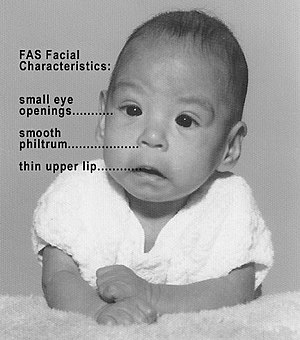
Fetal Alcohol Syndrome (FAS)
No. 134; October 2023
Fetal Alcohol Syndrome is a condition that develops in a baby exposed to alcohol before birth. A child with fetal alcohol syndrome may have specific abnormal facial features, small head size, and problems with development including delayed language, learning, and poor impulse control. Children with fetal alcohol syndrome are at high risk for problems such as Attention-Deficit/Hyperactivity disorder (ADHD), intellectual disability, learning problems, and emotional issues. Early diagnosis and intervention are important and helpful for children with fetal alcohol syndrome to prevent possible behavioral disorders and help with learning.

Children with Fetal Alcohol Syndrome have:
- Abnormal facial features
- Low weight and/or height before birth or after birth
- Small head size
- Abnormalities of their brain development that could cause seizures
- Language or learning problems, and/or intellectual disability
- Significant impulsivity or behavior problems
Abnormal facial features in children with Fetal Alcohol Syndrome include two of the following:
- Small eye openings
- Smooth area between nose and above upper lip (philtrum)
- Thin upper lip
- Flat nose bridge
Children with Fetal Alcohol Syndrome are at high risk for the following:
- Attention-Deficit/Hyperactivity Disorder
- Intellectual Disability
- Seizure Disorders
- Anxiety Disorders
- Language and learning problems
- Psychosis (hearing voices or seeing things that are not there)
- Impulsive behaviors and behavioral disturbance
Children can be diagnosed with partial forms of fetal alcohol syndrome if they show the abnormal features even when there is no clear proof that their mother drank alcohol during pregnancy. Some children with partial fetal alcohol syndromes show only some of the features. This may be called “fetal alcohol effects.” When a pregnant person drinks alcohol later in pregnancy, sometimes the physical facial features do not develop in the child, but the other problems still happen.
Frequently Asked Questions
What types of problems do children with fetal alcohol syndrome often have?
- Problems making friends with other children their own age because they may come across as younger than their age or unable to share and take turns
- Difficulties in school due to their learning lagging behind other children in their grade
- Impulsive behaviors, short attention span, and hyperactivity
- Problems with other adults because they may act like younger children
Why does drinking alcohol during pregnancy cause fetal alcohol syndrome in a child?
When a person drinks alcohol during pregnancy, it acts as a toxin and interferes with the normal growth and development of the brain and body of the developing infant.
What is the best way to prevent fetal alcohol syndrome?
Make sure that people who can become pregnant or are already pregnant learn that drinking alcohol while pregnant can be potentially harmful to their babies. Anyone who is pregnant should have regular care throughout the pregnancy. If a pregnant person has a problem with using alcohol and cannot stop using, substance use treatment during pregnancy should be offered.
Can children with fetal alcohol syndrome improve?
Growth and weight may become normal, but having short stature and intellectual limitations may continue into adulthood. Many social, educational and behavioral problems in children with fetal alcohol syndrome can get much better with help:
- ADHD can be treated with medication and therapy
- Language and learning problems can be improved with tutoring, speech and language therapy, and special education services
- Social skills can be improved with therapy and social skills groups
- Family education and support can be very helpful in easing the problems of children with fetal alcohol syndrome
What you can do if you suspect that your child may have fetal alcohol syndrome?
- Talk to your pediatrician or a mental health professional and discuss any and all concerns
- Ask for a referral to an expert to evaluate your child for fetal alcohol syndrome
Related Facts For Families
Related Resources
Resources you can use to learn more about fetal alcohol syndrome and get support: